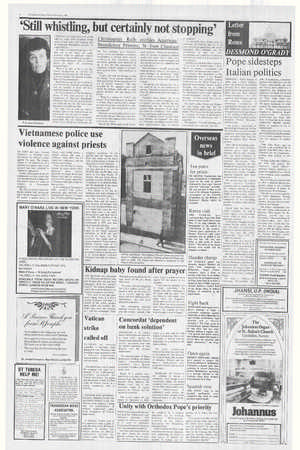Page 2, 9th December 1983
Page 2

Report an error
Noticed an error on this page?If you've noticed an error in this article please click here to report it.
Tags
Share
Related articles
Bishops Intervene In Italian Election
Catholic Information From Abroad
High Hopes Over Poland
Divorce Law Referendum Fans Anti-clericalism In Italy
Stingy Reaction Has Turned Into Rebellion
Pope sidesteps Italian politics
PERHAPS a Polish Bishop of Rome and a Prime Minister from the formerly anti-clerical Socialist Party w.ere necessary before the foreign policies of the Holy See and Italy became complementary. At this moment, both certainly seem to be working overtime to encourage resumption of negotiations between the USA and USSR over nuclear arms. This gave particular significance to the meeting on December I between Pope John Paul and the Socialist Prime Minister, Bettino Craxi.
the meeting showed how far the
The positive atmosphere of
Socialists have moved from their traditional anti-clericalism and how successful Pope Paul has been in staying above Italian politics.
The talk of promoting peace, customary at such meetings, seemed more than mere rhetoric. For its part, the Holy See has been insistent in warnings against the dangers of nuclear holocaust. The November meeting of the Pontifical Academy of Science, and speeches of the Pope and the Secretary of State, Cardinal Agostino Casaroli, have been devoted to this issue.
On return from the United States recently Cardinal Casaroli said on television that the Vatican offered its good offices to both the USA and the USSR to avoid nuclear conflict and he has since reaffirmed a willingness to do everything possible to reduce international tensions.
Asked what the Holy See could contribute, he said it could suggest wnat diplomatic moves could be taken at any particular moment.
As President Reagan has just revoked the law which, for the past 116 years, has prevented diplomatic relations between the Holy See and the USA, presumably they will be established shortly.
But is there any chance of Vatican mediation or will it be ignored as in its past attempt to organise a conference for contestents in the Vietnam war?
Isn't the identification of Pope John Paul with the Solidarity movement (in Russian eyes but also in American estimates) an insurmountable obstacle? His insistence on human rights in Eatt Europe is sufficient for the Russians to dub him a "political Pope".
Yet there is evidence of continuing Vatican-Holy See
links. Exceptionally, Lithuanian bishops were allowed to visit the Vatican some months ago. And the Vatican never added fuel to suggestions that Bulgaria and implicitly, the KGB was behind Ali Agca's assassination attempt on Pope John Paul (the accusation seems shakier since Ali Agca's testimony on other matters has been contested by the Italian investigating magistrate). Moreover despite
comparisons between Solzhenitsyn and Pope John Paul, the Pope has never totally condemned Marxist society. Rather he suggests it can be transformed.
Most important of all, like the late Cardinal Stefan Wyszynski, he has shown constant concern with the menace of nuclear arms.
Pope John Paul's idea of Europe is not a political one of opposed East-West blocs but a Christian one of a community, arching from Iceland to the Urals.
Perhaps neither the USSR nor the USA will request the Vatican's "good offices" although Vatican diplomacy is expert in negotiations even if not in the technical issues regarding nuclear arms.
But the Vatican's concern and its offer to mediate should give greater weight to any eventual recommendations it makes in reducing East-West tensions.
This also seems a new priority for Italian diplomacy. Having agreed to installations of US missiles, Italy has become more active in East Europe.
The Italian Ambassador was the only foreign ambassador at Moscow's Red Square for the military march past on November 7. Representatives of Czechoslovakia and East Germany have visited Italy for the first time in years; while early in 1984' the Italian Prime Minister is to visit Hungary and the Foreign Minister, Giulio Andreotti will visit Romania.
blog comments powered by Disqus











